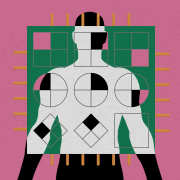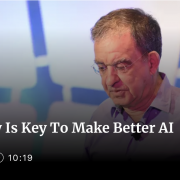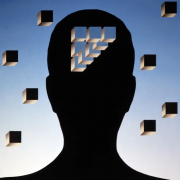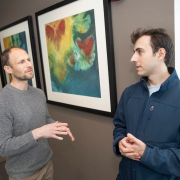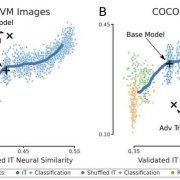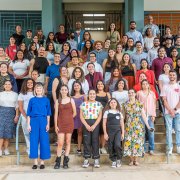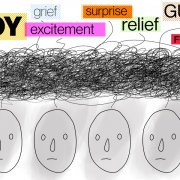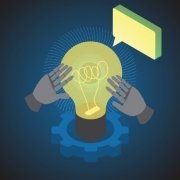September 18, 2023 - 12:00 pm
Researchers use multiple AI models to collaborate, debate, and improve their reasoning abilities to advance the performance of LLMs while increasing accountability and factual accuracy.
Rachel Gordon | MIT CSAIL
An age-old adage, often introduced to us during our formative years, is designed to nudge us beyond our self-centered, nascent minds: "Two heads are better than one." This proverb encourages collaborative thinking and highlights the...
September 12, 2023 - 4:00 pm
Singleton Auditorium (46-3002)
Prof. Michael Hasselmo; Director, Center for Systems Neuroscience; Boston University
Abstract: Recordings of neurons in cortical structures in behaving rodents show responses to dimensions of space and time relevant to encoding and retrieval of spatiotemporal trajectories of behavior in episodic memory. This includes the coding of spatial location by grid cells in entorhinal cortex...
August 30, 2023 - 2:45 pm
With hopes and fears about this technology running wild, it's time to agree on what it can and can't do.
By Will Douglas Heaven
When Taylor Webb played around with GPT-3 in early 2022, he was blown away by what OpenAI’s large language model appeared to be able to do. Here was a neural network trained only to predict the next word in a block of text—a jumped-up autocomplete. And yet it gave correct answers to many of the abstract problems that...
August 17, 2023 - 12:00 pm
John Werner - Contributor [I am an MIT Senior Fellow, 5x-founder & VC investing in AI]
Get ready for a lot of math…!
We have sort of an intuitive understanding of a big need in artificial intelligence and machine learning, which has to do with making sure that systems converge well, and that data is oriented the right way. Also, that we understand what these tools are doing, that we can look under the hood.
A lot of us have already heard of...
August 16, 2023 - 12:15 pm
Three graduate students forged a path to the same Picower Institute lab through participating in the MIT Summer Research Program in Biology and Neuroscience.
David Orenstein | The Picower Institute for Learning and Memory
Doctoral studies at MIT aren’t a calling for everyone, but they can be for anyone who has had opportunities to discover that science and technology research is their passion and to build the experience and skills to succeed....
July 20, 2023 - 10:45 am
Pictures conjured by the mind’s eye lack detail, despite how vividly you picture them
By Simon Makin
Here were the simple instructions given by a Harvard University assistant professor to people participating in a recent cognitive science study:
“Imagine the following scene. Visualize it in your mind’s eye, as vividly as you can: a person walks into a room and knocks a ball off a table.”
The professor, Tomer Ullman, then asked those in the...
July 12, 2023 - 4:00 pm
Researchers used fMRI to test ideas about complex decision-making
By Christy DeSmith, Harvard Staff Writer
How does the human brain navigate complex circumstances — say, driving through Harvard Square traffic at 5 p.m.?
One theory gaining support with psychologists and neuroscientists is that the brain creates causal models of the world that help with planning and execution. It’s akin to running mental simulations to see which outcomes are good...
July 6, 2023 - 5:00 pm
by Jennifer Michalowski, Massachusetts Institute of Technology
From cameras to self-driving cars, many of today's technologies depend on artificial intelligence to extract meaning from visual information. Today's AI technology has artificial neural networks at its core, and most of the time we can trust these AI computer vision systems to see things the way we do—but sometimes they falter. According to MIT and IBM research scientists, one way to...
June 29, 2023 - 6:00 pm
by Viviana Lupi
Tomaso Poggio is the Head of the Center for Brains, Minds and Machines and is an international pioneer in the field of Artificial Intelligence. On occasion of the workshop "DEEP LEARNING: Theory, Algorithms, and Applications" which took place in Povo - where he had worked at the time of Prof. Luigi Stringa - we asked him some questions to better understand AI and what we have to expect in the near future.
Professor Poggio, you...
June 22, 2023 - 10:15 am
Through her organization, Sprouting, Taylor Baum is empowering teachers to teach coding and computer science in their classrooms and communities.
Kris Brewer | Center for Brains, Minds and Machines
Taylor Baum knows that access is everything. So the fourth-year MIT PhD candidate in the Department of Electrical Engineering and Computer Science has been working in recent years to enhance STEM education in underrepresented communities in Puerto...
June 12, 2023 - 11:30 am
Washington, D.C.– Senate Majority Leader Chuck Schumer (D-NY) today spoke on the Senate floor highlighting this week’s Senators-only briefing on Artificial Intelligence, the first of three upcoming briefings on AI. Below are Senator Schumer’s remarks, which can also be viewed here:
It’ll be another busy week here in the Senate as we confirm more nominees and address pressing issues like AI.
Tomorrow, the Senate will convene the first of three...
June 5, 2023 - 10:45 am
Using insights into how people intuit others’ emotions, researchers have designed a model that approximates this aspect of human social intelligence.
Anne Trafton | MIT News Office
When interacting with another person, you likely spend part of your time trying to anticipate how they will feel about what you’re saying or doing. This task requires a cognitive skill called theory of mind, which helps us to infer other people’s beliefs, desires,...
May 18, 2023 - 2:00 pm
Singleton Auditorium (46-3002)
Dan Yamins, Stanford University
Abstract: The emerging field of NeuroAI has leveraged techniques from artificial intelligence to model brain data. In this talk, I will show that the connection between neuroscience and AI can be fruitful in both directions. Towards "AI driving neuroscience", I will discuss a new candidate...
May 9, 2023 - 4:00 pm
Singleton Auditorium (46-3002)
Eero Simoncelli, Silver Professor; Professor of Neural Science, Mathematics, Data Science and Psychology, NYU
Abstract: Inference problems in machine or biological vision generally rely on knowledge of prior probabilities, such as spectral or sparsity models. In recent years, machine learning has provided dramatic improvements in most of these problems using artificial neural networks, which are typically...
May 4, 2023 - 11:15 am
Despite the eye-catching claim that large AI language models like ChatGPT have achieved theory of mind, some experts find their abilities lackluster.
By Cody Cottier
When you converse with the latest chatbots, it’s easy to feel like they get you. Their deft responses often give an undeniable impression that they’re aware not only of what you say, but of what you think — what your words imply about your mental state.
Theory of Mind
Among...



